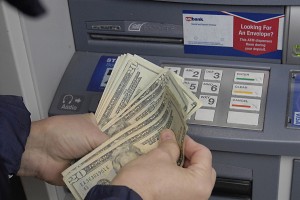Proving it is still capable of thinking different, a newly-released Apple Inc. (NASDAQ:AAPL) patent application describes a technology that would turn iOS users into one another’s cash machines. The U.S. Patent & Trademark Office published the application Jan. 31, although Apple submitted it in July 2011. The “ad-hoc cash dispensing network” would compete directly with ATMs by allowing users to provide cash to one another.
In the hypothetical network, Apple (AAPL) would serve as a deposit taker, allowing users to keep funds in consumer accounts. Should a user need a source of cash, an iOS app would allow the consumer to send an alert letting other users know of the cash need—proving details of the amount needed and location. Any users in the area that have signed up for the service will receive the alert, and if a willing lender is located, a meeting time and place is arranged.
According to the patent application, the network would provide “a method for transferring cash … comprising: selecting a meeting location and time based on the location of the requesting party and the providing party; and transmitting the determined meeting location and time to the requesting party and the providing party.”
 Once the cash is transferred, the requesting user’s Apple (AAPL) account is debited the transaction amount plus a service fee, and the cash provider’s account is credited. To incent users to participate and dispense cash to others, a portion of each service fee is paid to the providing user. For example, if $50 is requested and transferred between users, according to the patent application, “the cash dispensing server may deduct from the requesting user’s account $50 to cover the requested amount of cash, $5 to cover the service fee and $3 to cover the reward amount to the providing user.”
Once the cash is transferred, the requesting user’s Apple (AAPL) account is debited the transaction amount plus a service fee, and the cash provider’s account is credited. To incent users to participate and dispense cash to others, a portion of each service fee is paid to the providing user. For example, if $50 is requested and transferred between users, according to the patent application, “the cash dispensing server may deduct from the requesting user’s account $50 to cover the requested amount of cash, $5 to cover the service fee and $3 to cover the reward amount to the providing user.”
The concept also reinvents the idea of “borrowing” cash from friends, family and co-workers, as funds could immediately be transferred from one account to another as soon as the cash changes hands.
“This familiarity will increase the trust level between the requesting user and the proximate users,” the patent application states.
The patent also describes a possible ratings system in which ad-hock “bankers” are scored based on how satisfied other users have been with their service. Future users can then filter their cash requests to only ping “lenders” who have received at least a certain rating.
In its patent application, Apple (AAPL) acknowledges the few situations in today’s marketplace where cash is a necessity, as most merchants accept plastic. But Cupertino states the system would be useful during times when a user needs cash and there are no nearby ATMs by efficiently bringing together a cash requester and a cash provider. For example, an iOS user who comes up short at a night club could ping a request for nearby patrons to assist, or a user on vacation and in unfamiliar surroundings could send an alert to exchange some cash with a nearby local.
Should it be rolled to market, the concept would thrust Apple (AAPL) iTunes into a role similar to a bank—something many analysts have been expecting as it moves into the mobile payments realm. But the patent application also leaves the door open for Apple to work with one or more partners that could be the source of the “from” account described in the patent.



